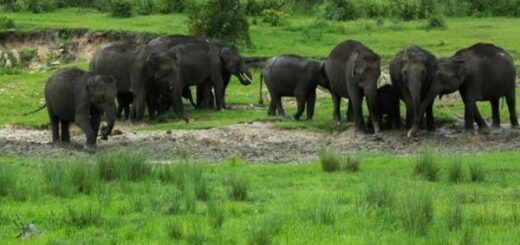National Current Affairs – UPSC/IAS Exams- 9th August 2019
CITES
Topic: Environment and Ecology
In News: India has submitted proposals regarding changes to the listing of five various wildlife species in the CITES secretariat meeting.
More on the Topic:
- CITES (Convention on International Trade in Endangered Species on Wild Fauna and Flora) is an international treaty to ensure that trade in wild animals and plants do not threaten their survival.
- It was signed on March 3, 1973 (Hence world wildlife day is celebrated on march 3).
- It is administered by the United Nations Environment Programme (UNEP).
- Secretariat, Geneva (Switzerland).
- CITES is legally binding on state parties to the convention, which are obliged to adopt their own domestic legislation to implement its goals.
It classifies plants and animals according to three categories, or appendices, based on how threatened. They are.
- Appendix I: It lists species that are in danger of extinction. It prohibits commercial trade of these plants and animals except in extraordinary situations for scientific or educational reasons.
- Appendix II species: They are those that are not threatened with extinction but that might suffer a serious decline in number if trade is not restricted. Their trade is regulated by permit.
- Appendix III species: They are protected in at least one country that is a CITES member states and that has petitioned others for help in controlling international trade in that species.
Indian Proposal:
- The proposals submitted are regarding changes in the listing of the smooth-coated otter (IUCN: vulnerable), small-clawed otter(Vulnerable), Indian star tortoise(Vulnerable), Tokay gecko(Not evaluated), wedge fish (Vulnerable) and Indian rosewood(Vulnerable).
- The country seeks to boost the protection of all the five animal species as they are facing a high risk of international trade.
- For the Indian rosewood, the proposal is to remove the species from CITES Appendix II. The species covered by CITES are listed in three appendices on the degree of protection they require.
Source: The Hindu
Prevention of Money Laundering Act (PMLA)
Topic: Polity and Governance
In News: The Centre has issued a notification on certain changes in the Prevention of Money Laundering Act (PMLA), some of which tend to treat money laundering as a stand-alone crime and also expand the ambit of “proceeds of crime” to assets that may have been derived from any other criminal activity related to scheduled offences.
More on the Topic:
- Till now Money Laundering was not an independent crime; rather depended on another crime, known as the ‘predicate offence’ or ‘scheduled offence’, the proceeds of which are made the subject matter of crime of money laundering.
- The most crucial amendments are the deletion of provisions in sub-sections (1) of Section 17 (Search and Seizure) and Section 18 (Search of Persons).
- These provisions required the pre-requisite of an FIR or charge sheet by other agencies that are authorised to probe the offences listed in the PMLA schedule.
- An explanation is added to Section 45 that clarifies that all PMLA offences will be cognisable and non-bailable.
- Therefore, Enforcement Directorate will be empowered to arrest an accused without a warrant, subject to certain conditions.
- Another vital amendment makes concealment of proceeds of crime, possession, acquisition, use, projecting as untainted money, or claiming as untainted property as independent and complete offences under the Act.
- Section 72 will now give power to the Centre to set up an Inter-Ministerial Coordination Committee for inter-departmental and inter-agency coordination for operational and policy level cooperation, for consultation on anti-money laundering and counter-terror funding initiatives.
About Money Laundering:
- Money laundering is the process of making large amounts of money generated by criminal activity, such as drug trafficking or terrorist funding, appear to have come from a legitimate source.
- Criminal activities like illegal arms sales, smuggling, drug trafficking and prostitution rings, insider trading, bribery and computer fraud schemes produce large profits.
- Thereby it creates the incentive for money launderer to “legitimize” the ill-gotten gains through money laundering.
- The money so generated is called ‘dirty money’ and money laundering is the process of conversion of ‘dirty money’, to make it appear as ‘legitimate’ money.
- In India, the specific legislation dealing with money laundering is the Prevention of Money-Laundering Act ((PMLA), 2002
The law was enacted to combat money laundering in India and has three main objectives :
- To prevent and control money laundering.
- To provide for confiscation and seizure of property obtained from laundered money.
- To deal with any other issue connected with money-laundering in India.
- Under the PMLA Act, the Enforcement Directorate is empowered to conduct a Money Laundering investigation. Directorate of Enforcement is a specialized financial investigation agency under the Department of Revenue, Ministry of Finance, Government of India.
- Apart from the provisions of PMLA, there are other specialised provisions such as RBI/SEBI/IRDA anti-money laundering regulations.
Model Mains Question: Discuss the provisions of money laundering prevention act 2002 and its evolution and impact over the years.
Source: The Hindu, Wikipedia
PM Kisan Maan Dhan Yojana
Topic: Government Policy
In News: Registration for the PM Kisan Maan Dhan Yojanana has been started.
More on the Topic:
- It is an old age pension Scheme that has been envisioned with an aim to improve the life of small and marginal farmers of the country.
- The scheme is voluntary and contributory for farmers in the entry age group of 18 to 40 years and a monthly pension of Rs. 3000/- will be provided to them on attaining the age of 60 years.
- The farmers will have to make a monthly contribution of Rs.55 to Rs.200, depending on their age of entry, in the Pension Fund till they reach the retirement date i.e. the age of 60 years.
- The Central Government will also make an equal contribution of the same amount in the pension fund. The spouse is also eligible to get a separate pension of Rs.3000/- upon making separate contributions to the Fund.
- The Life Insurance Corporation of India (LIC) shall be the Pension Fund Manager and responsible for Pension pay out.
Source: PIB, Vikaspedia
Rotavirus Vaccination
Topic: Health
In News: The Health Ministry has drawn an ambitious plan under the 100-days agenda of the government, wherein it has been decided to provide Rotavirus vaccine to every child across all 36 states and UTs by September, 2019.
More on the Topic:
- Out of all the causes of diarrhoea, rotavirus is a leading cause of diarrhoea in children less than 5 years of age.
- It is estimated that rotavirus cause 8,72,000 hospitalizations; 32,70,000 outpatient visits and estimated 78,000 deaths annually in India.
- Rotavirus diarrhoea presents in similar manner like any other diarrhoea but can mainly be prevented through rotavirus vaccination.
- Other diarrhoea can be prevented through general measures like good hygiene, frequent hand washing, safe water and safe food consumption, exclusive breastfeeding and vitamin A supplementation.
- Keeping in view the burden of disease which can be prevented through vaccination, National Technical Advisory Group on Immunization (NTAGI), an expert committee, recommended introduction of rotavirus vaccine (RVV) in the Universal Immunization Programme (UIP).
Universal Immunisation Programme:
- It is a free vaccination program launched by the Union Government in 1985 against vaccine preventable diseases.
- Under the Universal Immunization Programme (UIP) 11 vaccines are administered. These vaccines are:
- Diptheria, Pertusis, Tetanus(DPT), Polio, Measles, Bacillus Calmette-Guerin(BCG), Hepatitis B, Japanese Encephalitis (JE)(in endemic districts), Rotavirus, Rubella and Polio (injectable)
- Mission Indradhanush is the main programme under this.
Source: PIB
National Institute of Solar Energy
Topic: Renewable Energy
In News: An agreement has been signed between the National Institute of Solar Energy (NISE) and the United Nations Industrial Development Organization (UNIDO) to initiate a skill development programme for different levels of beneficiaries in the solar thermal energy sector.
More on the Topic:
- NISE and UNIDO will engage national and international experts to bring the best practices by developing specialized training material.
- The agreement is a part of the ongoing MNRE-GEF-UNIDO project implemented jointly by UNIDO and to support capacity building and skill development of technical manpower in the Concentrated Solar Thermal Energy Technologies (CST) which are being used to replace conventional fossil fuels e.g. coal, diesel, furnace oil etc. and save costs and emissions in the industrial process heat applications.
United Nations Industrial Development Organization:
- UNIDO is an UN coordinating body central to the promotion of industrial development, poverty reduction and environmental sustainability.
- Its mission is to promote Inclusive and sustainable industrial development (ISID) in was described in the ‘Lima Declaration’.
- The main objectives of UNIDO are,
- The promotion of industrial growth and technological progress,
- Most effective use of human resources,
- Equitable development through industrialization, industrial development and environmental protection,
- International cooperation in industrial investment and technology.
Source: PIB, Wikipedia
UN Palestine refugee agency
Topic: International Organizations
In News: India has contributed USD 5 million in 2019 to UN Palestine refugee agency. The contribution was provided in support of UNRWA’s core programmes and services, including education, health care, and relief and social services.
More on the Topic:
- India has increased its annual financial contribution fourfold to the United Nations Relief and Works Agency for Palestine Refugees in the Near East (UNRWA) core budget, from USD 1.25 million in 2016 to USD 5 million in 2018.
- Following the 1948 Arab-Israeli conflict, UNRWA was established by United Nations General Assembly to carry out direct relief and works programmes for Palestine refugees.
- UNRWA is the only UN agency dedicated to helping refugees from a specific region or conflict and is separate from UNHCR.
- Aid is provided in five areas of operation: Jordan, Lebanon, Syria, the Gaza Strip and the West Bank, including East Jerusalem; aid for Palestinian refugees outside these five areas is provided by UNHCR.
- The UN agency is going through a difficult financial situation due to voluntary contributions from a limited donor base.
Source: The Hindu, Wikipedia














